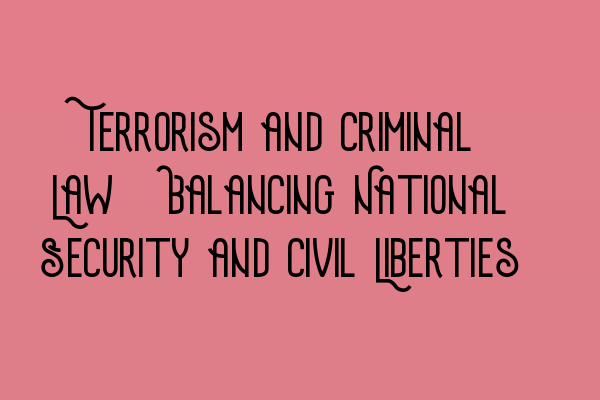Terrorism and Criminal Law: Balancing National Security and Civil Liberties
Terrorism is a grave threat to national security, requiring governments to implement robust measures to combat it. However, the line between protecting the citizens and encroaching upon civil liberties can often become blurred. In this blog post, we will delve into the intricate relationship between terrorism and criminal law, exploring how the legal system strives to strike a delicate balance.
Understanding Terrorism
Terrorism refers to the use of violence, coercion, or intimidation for political or ideological purposes. Acts of terrorism pose a serious threat to public safety and disrupt societal harmony. It is therefore crucial for the criminal justice system to respond effectively.
In order to comprehend the nuances of counterterrorism legislation, aspiring legal professionals must equip themselves with a solid understanding of criminal law. SQE 1 Practice Exam Questions can help in honing your knowledge and preparing you for the challenges of the legal profession.
National Security versus Civil Liberties
The concept of national security is at the forefront of counterterrorism efforts. Governments around the world have enacted legislation to combat terrorism and safeguard their populations. However, these measures can potentially infringe upon civil liberties and individual rights.
It is essential for legal professionals to navigate this delicate balance between national security concerns and the protection of civil liberties. SQE 1 Practice Mocks FLK1 and FLK2 provide valuable insights into how criminal law addresses these concerns.
The Legal Framework
In the United Kingdom, the legal framework for counterterrorism is primarily governed by the Terrorism Act 2000 and the Terrorism Act 2006. These acts define offenses related to terrorism, outline investigative powers, and establish procedures for handling suspected terrorists.
Understanding the intricacies of counterterrorism legislation is crucial for legal professionals. SQE 2 Preparation Courses offer comprehensive training, covering the substantive law, procedural rules, and ethical considerations related to terrorism and criminal law.
Challenges and Controversies
While counterterrorism measures are necessary, they can also give rise to challenges and controversies. One such area of contention is the balance between surveillance powers and privacy rights. Striking the right balance is vital to ensure that the fundamental rights of individuals are not unduly compromised.
SQE 1 Preparation Courses can provide relevant insights into the complexities of criminal law, including the legal and ethical dilemmas surrounding counterterrorism efforts.
Conclusion
The fight against terrorism requires a delicate equilibrium between national security and civil liberties. Aspiring legal professionals must be vigilant in understanding the legal framework surrounding terrorism and criminal law, and how it balances the need for security with fundamental rights and freedoms.
For more information on SQE exams, including the upcoming SRA SQE Exam Dates, visit our website and embark on your journey towards a successful legal career.
Related Articles:
- SQE 1 Practice Exam Questions
- SQE 1 Practice Mocks FLK1 FLK2
- SQE 2 Preparation Courses
- SQE 1 Preparation Courses
- SRA SQE Exam Dates
